Tendon fibroblast inflammatory responses depend on NF-κβ and JAK/STAT signaling and alter mechanotransduction pathways

Tendon fibroblast inflammatory responses depend on NF-κβ and JAK/STAT signaling and alter mechanotransduction pathways
Sup, M.; Kim, M. M.; Song, L.; Genin, G. M.; Thomopoulos, S.
AbstractTendon pathologies, including both chronic injuries and acute tendon tears, are some of the most common musculoskeletal injuries. Recent studies have suggested the importance of inflammation in the healing process in both acute and chronic tendon injury. However, there remain gaps in knowledge that hinder progress in the development of therapeutics to improve healing. A more complete characterization of the inflammatory response in tendon is needed, by defining the relative roles of different molecular pathways, and determining how these pathways interact with tendon mechanobiology. To investigate these questions, an in vitro model was developed, wherein the complexity of the in vivo healing environment was simulated by applying M1 macrophage conditioned media (M1-CM) to tendon fibroblasts (TFs). Characterization of the M1-CM and its effect on TFs revealed a robust inflammatory response, including upregulation of over 500 genes and increased secretion of several cytokines in TFs. The NF-{kappa}{beta} and JAK/STAT signaling pathways were necessary for the response to M1-CM, and each pathway was responsible for different downstream responses to inflammation in TFs. When considering the role of mechanical loading in tendon responses to inflammation, it was found that TF responses to loading were altered by the presence of an inflammatory stimulus. Analysis of the genes that responded differently to loading with inflammation present suggested changes in pathways involving extracellular matrix organization and G protein signaling. Mathematical modeling based upon these results revealed time-dependent suppression of mechanosensitivity, suggesting that therapeutic timing of inflammatory or anti-inflammatory interventions could restore or attenuate mechanical responsiveness to modulate rehabilitation outcomes. Results reveal that inflammation disrupts mechanosensitivity in tendon healing, and suggest potential pathways for therapeutic intervention.